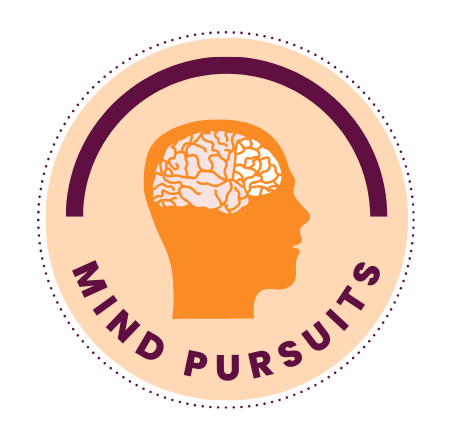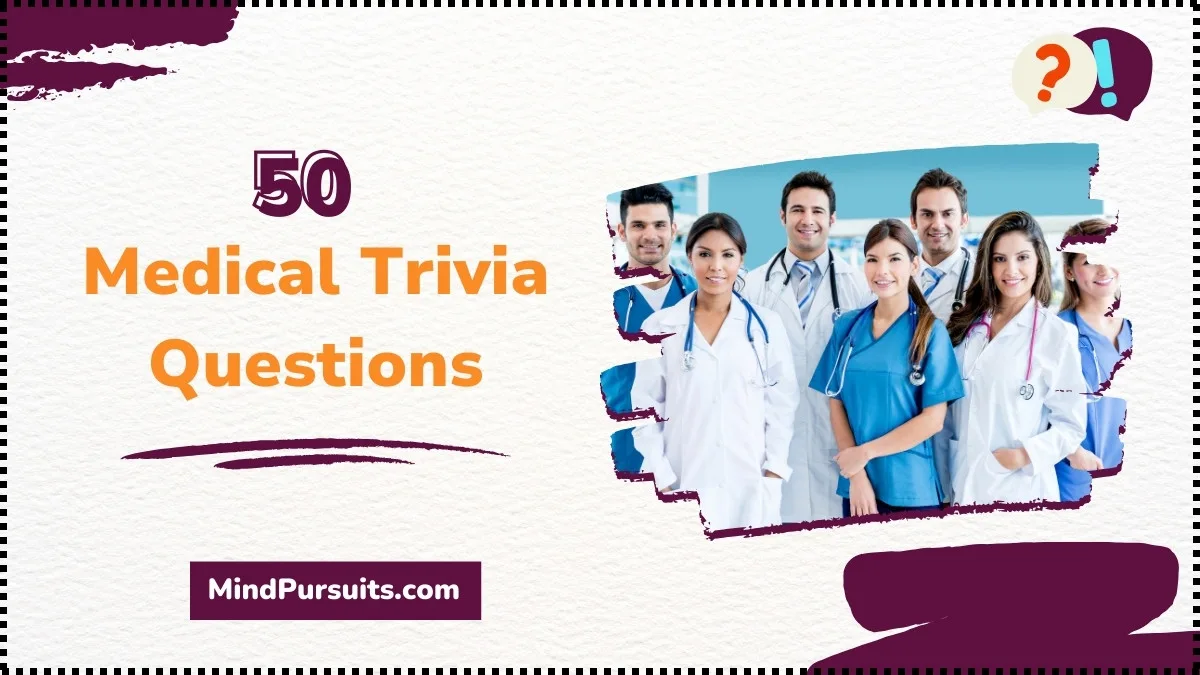Ready to boost your brain with some fascinating medical trivia questions?
This journey is packed with surprising facts and insights into the world of health and medicine.
It’s a fun way to test your knowledge, learn something new, and even impress your friends with your medical smarts.
Let’s get your curiosity ticking and your mind buzzing.
It’s not just about facts; it’s about discovering the wonders of the human body and the incredible world of medicine.
Best Medical Trivia Questions
#1. What vitamin is produced by the human body when exposed to sunlight, and is crucial for bone health?
Vitamin D
#2. Which organ in the human body can regenerate tissue, allowing it to recover from damage?
Liver
#3. Identify the hormone primarily responsible for regulating blood sugar levels and is used in the treatment of diabetes.
Insulin
#4. What is the name of the largest artery in the human body, responsible for transporting oxygen-rich blood away from the heart?
Aorta
#5. Can you name the condition characterized by a deficiency of red cells or of hemoglobin in the blood, resulting in pallor and weariness?
Anemia
#6. What’s the term for the medical procedure used to view the inside of the body using sound waves, often used during pregnancy?
Ultrasound
#7. Which blood type is known as the universal donor, able to donate blood to recipients of any blood type?
O Negative
#8. In terms of the nervous system, what is the term for the junction between two neurons, where nerve impulses pass?
Synapse
#9. What name is given to the disease caused by the deficiency of vitamin C, leading to symptoms like bleeding gums and bruising?
Scurvy
#1o. Which part of the brain is responsible for coordinating voluntary movements and maintaining posture, balance, and equilibrium?
Cerebellum
Hard Medical Trivia Questions
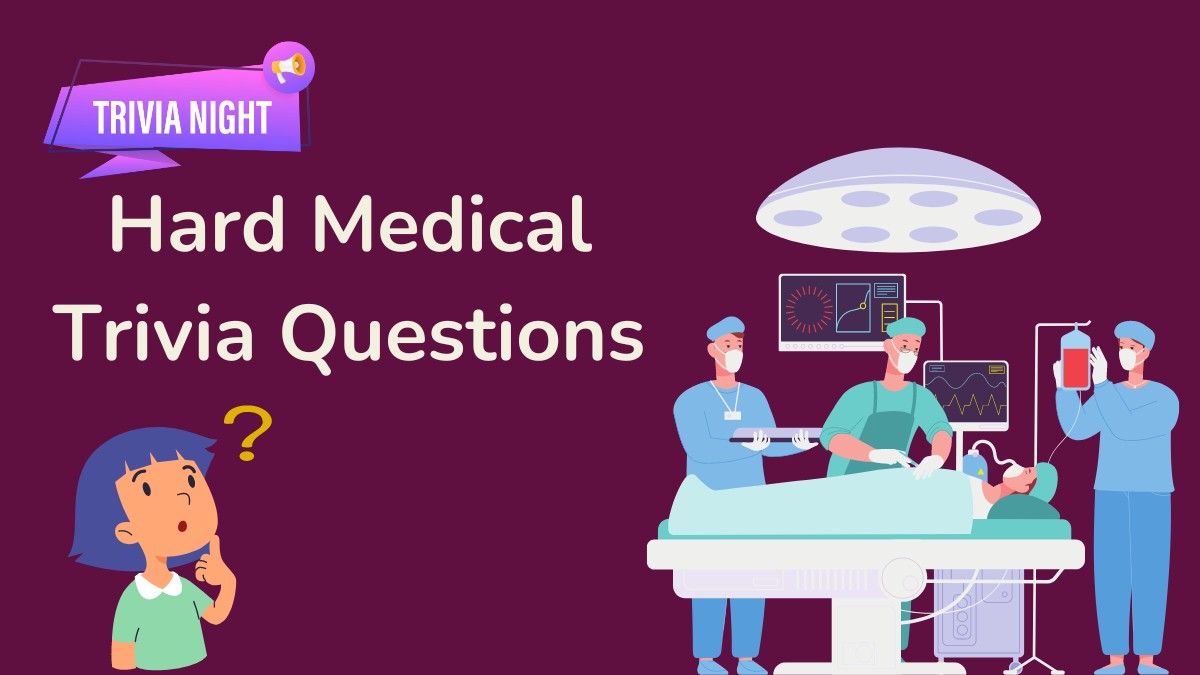
#1. What is the only bone in the human body not connected to another bone?
The hyoid bone, located in the throat, supports the tongue and its muscles.
#2. Which organ has the ability to regenerate tissue rather than form scar tissue after injury?
The liver is capable of regenerating its tissue, making it unique among human organs.
#3. What is the name of the condition where individuals have an extra rib, which can cause nerve and artery compression?
Thoracic Outlet Syndrome, often due to the presence of a cervical rib.
#4. In terms of cell count, are there more bacterial cells or human cells in the body?
Bacterial cells; the human body has more bacterial cells than human cells, with bacteria mostly residing in the gut.
#5. What is the longest nerve in the human body, and what part of the body does it serve?
The sciatic nerve, which runs from the lower back down through each leg.
#6. Identify the rare medical condition characterized by the growth of excess skin, often referred to as “werewolf syndrome.”
Hypertrichosis, which causes abnormal hair growth over the body.
#7. What blood type is known as the universal donor type?
O negative blood type is considered the universal donor.
#8. Which genetic disorder is known as “the royal disease” due to its prevalence in European royal families?
Hemophilia is a condition that affects the blood’s ability to clot.
#9. What part of the human brain is responsible for regulating hunger and satiety?
The hypothalamus controls hunger, thirst, and the body’s natural cycles, including satiety.
#10. What is the term for the phenomenon where amputees feel sensations, including pain, in the limb that has been amputated?
Phantom limb syndrome, where sensations are perceived as if they come from the absent limb.
Easy Medical Trivia Questions
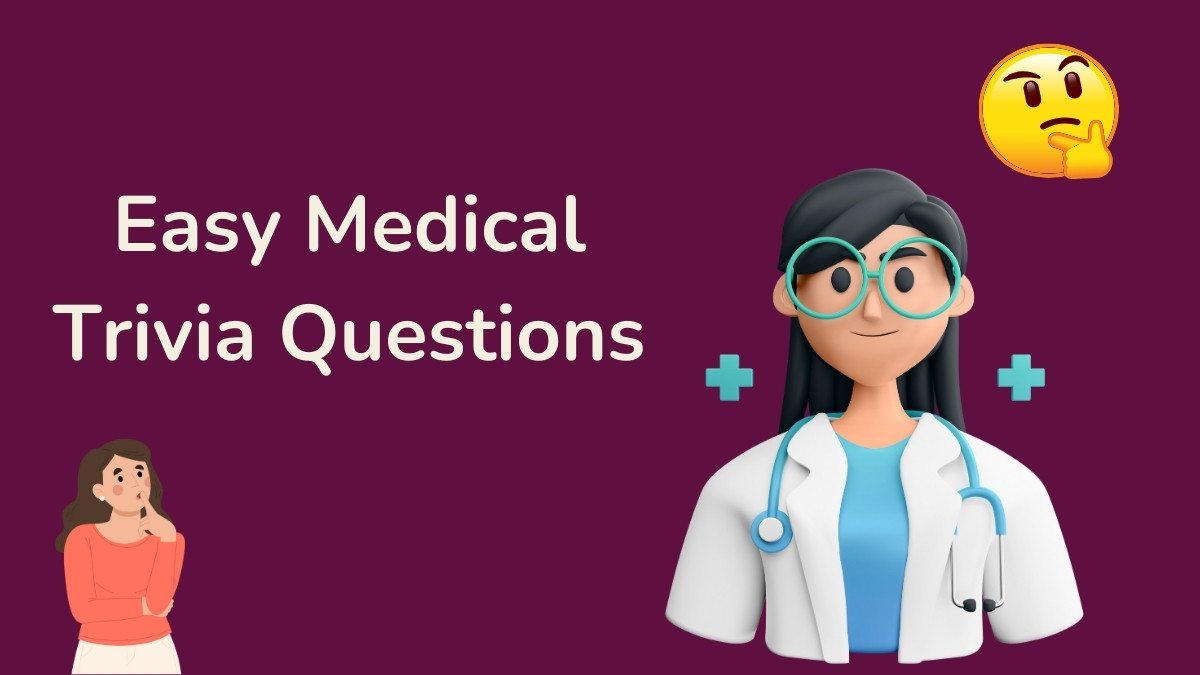
#1. What is the name of the largest organ in the human body?
The skin is the largest organ in the human body.
#2. Which part of the body produces insulin?
The pancreas produces insulin.
#3. What type of cells carry oxygen through the body?
Red blood cells carry oxygen through the body.
#4. How many bones are in the adult human body?
There are 206 bones in the adult human body.
#5. What is the common term for the medical condition rhinitis?
The common cold is often referred to as rhinitis.
#6. Which body part is responsible for your sense of smell?
The nose is responsible for the sense of smell.
#7. What is the main function of white blood cells?
The main function of white blood cells is to fight infection.
#8. How many chambers does the human heart have?
The human heart has four chambers.
#9. What organ is responsible for filtering and removing waste from the blood?
The kidneys filter and remove waste from the blood.
#10. Which vitamin is known as the “sunshine vitamin”?
Vitamin D is known as the sunshine vitamin because it’s produced in the skin in response to sunlight.
Funny Medical Trivia Questions
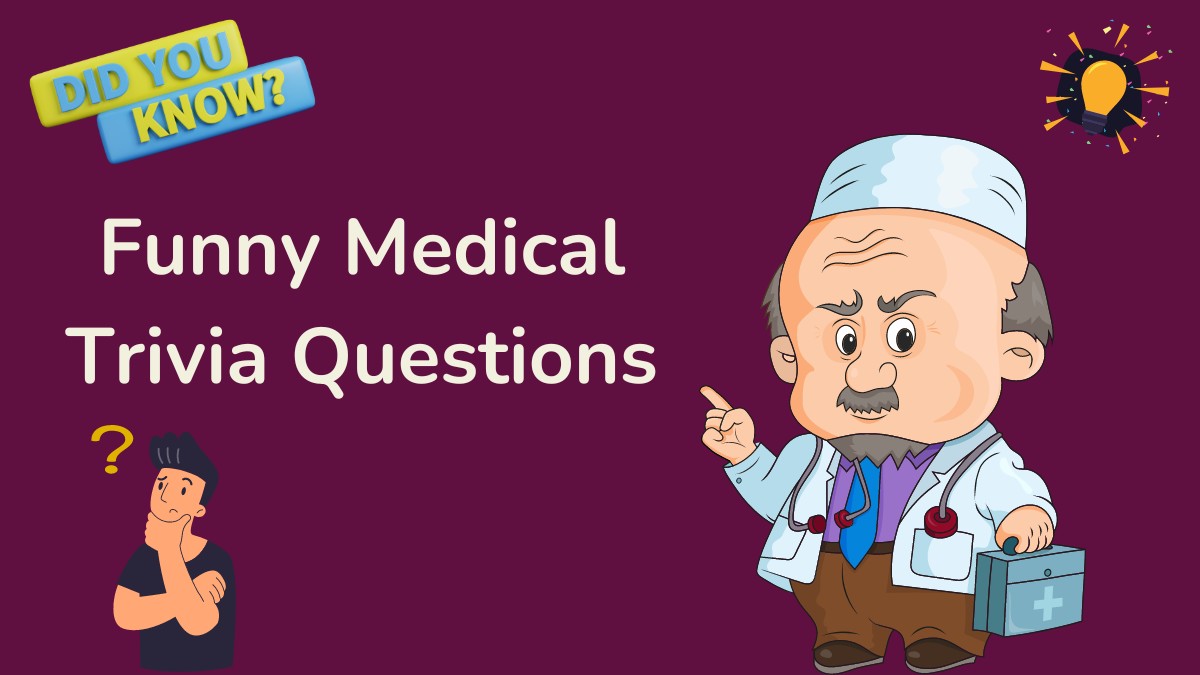
#1. What part of the body can you find the “funky bone,” which isn’t a bone at all?
The “funky bone” is a playful name for the funny bone, which is actually a nerve (the ulnar nerve) that runs down the inside part of your elbow.
#2. Why do doctors wear green or blue scrubs in surgery instead of fashion-forward neon pink?
Green and blue scrubs help reduce eye strain from the bright operating lights and make bloodstains less conspicuous, not because they don’t appreciate neon pink.
#3. What’s the medical term for a condition where you can’t stop producing puns, often seen in Dad-itis?
There’s no official medical term for an uncontrollable urge to make puns, but it’s commonly joked as “Pun Syndrome” or in severe cases, “Dad Joke-itis.”
#4. How many muscles does it take to frown compared to smiling, and what’s the best exercise?
It takes 43 muscles to frown and only 17 to smile, making smiling the best and easiest facial exercise.
#5. What does your body do more times a day than the earth rotates, hinting you’re more active than you think?
Blink! The average person blinks around 15-20 times per minute, totaling over 20,000 times a day.
#6. If someone has “borborygmi,” should you get them a gift, and what might it be?
Borborygmi is the medical term for stomach rumbling, so perhaps a snack would be the most appropriate gift.
#7. What’s the technical term for a “brain freeze,” which sounds like it could be a cool dance move?
The technical term for a brain freeze is “sphenopalatine ganglion neuralgia,” not nearly as fun to say while sipping a slushie.
#8. Why can’t you tickle yourself, or is it just a lack of trying hard enough?
You can’t tickle yourself effectively because your brain anticipates your touch and doesn’t react the same way as it does to unexpected touch from others.
#9. What organ in your body is an immortal cell line factory, useful for science but lazy at parties?
The liver is known for its regenerative properties, but HeLa cells (from Henrietta Lacks’ cervical cancer cells) are the actual “immortal” cell line used in research.
#10. In the medical world, what does it mean if you have a “positive Babinski reflex,” and does it mean you’re optimistic?
A positive Babinski reflex, where the big toe moves upward when the sole is stimulated, is normal in infants but may indicate nervous system disorders in adults. It has nothing to do with being optimistic, despite the positive outlook.
Medical Trivia Questions For Kids
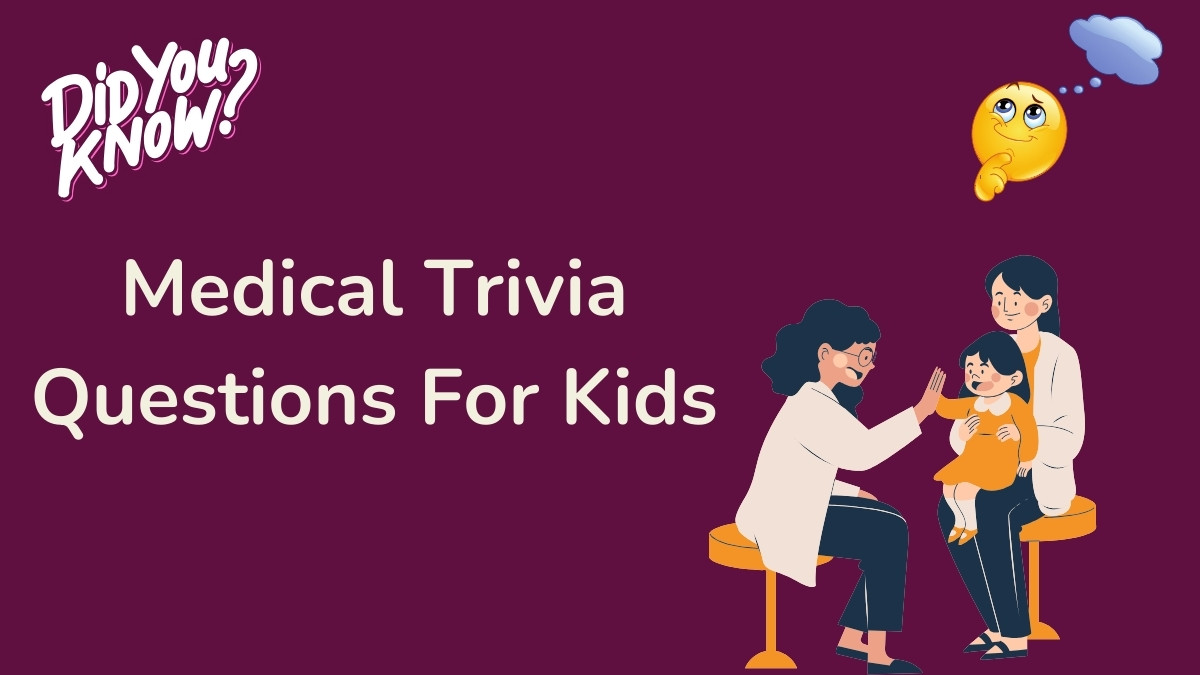
#1. What color is the blood inside your body when it doesn’t have oxygen?
Blue. Actually, this is a common misconception! Blood without oxygen is dark red; it looks blue under the skin because of how light interacts with the skin and blood.
#2. How many bones are in a baby’s body when they are born?
Babies are born with about 270 bones, but some fuse together as they grow, leaving adults with 206 bones.
#3. What’s the strongest muscle in the human body based on its size?
The masseter, or jaw muscle, is the strongest in terms of force it can exert.
#4. How many times does the average human heartbeat in a day?
About 100,000 times a day.
#5. What part of the body heals the fastest?
The tongue is one of the fastest healing parts of the body.
#6. What is the human body’s largest organ?
The skin is the largest organ of the human body.
#7. How many teeth do adult humans have, and how is it different from when they are kids?
Adults have 32 teeth, but children have 20 baby (or primary) teeth.
#8. Why do humans yawn?
Scientists believe yawning helps bring more oxygen into the lungs and may help cool the brain.
#9. What does the brain use for energy?
The brain uses glucose, a type of sugar, for energy.
#10. How long is the small intestine in an average adult?
The small intestine is about 22 feet (6.7 meters) long in an average adult.
Conclusion
And there you have it, a collection of medical trivia that spans the quirky, the fascinating, and the downright astonishing aspects of the human body and medicine.
We hope these tidbits of knowledge have sparked your curiosity and maybe even impressed you with the wonders of medical science.
Got a favorite question or one that stumped you?
We’d love to hear about it in the comments below! Keep the conversation going and share your top picks!
